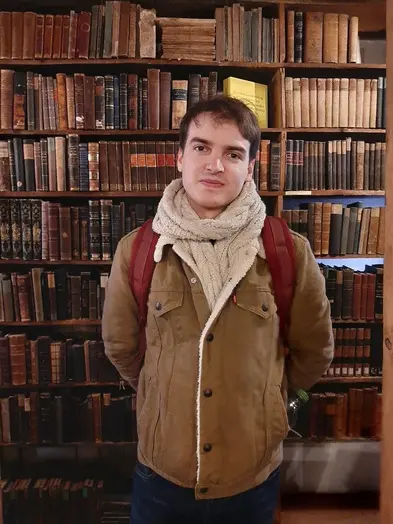Welcome! Since December 2024, I am a Postdoctoral fellow at the University of Duisburg-Essen in the research group of Massimo Bertolini.
Previous positions:
From March 2024 to June 2024, I was an Invited Researcher at the I.H.E.S..
From March 2023 to February 2024, I was a Postdoctoral fellow at the University of Heidelberg in the research group of Otmar Venjakob.
From March 2022 to December 2022, I was a Postdoctoral fellow at the University of Bordeaux under the supervision of Denis Benois as part of the GALF project.
From March 2021 to February 2022, I was a Postdoctoral fellow at the Università degli Studi di Genova working with Stefano Vigni. I was supported by the INdAM and the research grant: assegni di collaborazione ad attività di ricerca « Ing. G. Schirillo ».
From August 2018 to December 2020, I was a Postdoctoral fellow at the Max Planck Institute for Mathematics. In Fall 2020, I was also a (remote) Postdoctoral participant of the program Cohomology in Arithmetic held at the Centre de Recherches Mathématiques in Montréal.
My Ph.D. advisor is Antonio Lei.
I am interested in number theory, especially in Iwasawa theory and p‑adic Hodge theory.
Contact & C.V.
- Address:
- Thea-Leymann-Str. 9, 45127 Essen, Germany
- Office:
- WSC-O-3.44
- Phone:
- +49201183
- E-mail:
- gautier.ponsinet@uni-due.de
Other e-mail addresses:
- C.V. :
Teaching
Winter Semester 2025/2026:
- Number theory seminar: elliptic curves, with Xiaoyu Zhang. Moodle page.
- Modular forms I, with Xiaoyu Zhang. Moodle page.
Previous teaching:
Summer Semester 2025:
- Number theory seminar: modular forms, with Xiaoyu Zhang. Moodle page.
- Modular forms II, with Xiaoyu Zhang. Moodle page.
Articles
- arXiv:
- ponsinet_g_1
- MathSciNet:
- 1210959
- ORCID:
- 0000-0003-2297-268X
- zbMath:
- ponsinet.gautier
Submitted
- On a characterisation of perfectoid fields by Iwasawa theory
- arXiv:
- 2507.21801
- Bloch-Kato groups over perfectoid fields and Galois theory of p‑adic periods
- arXiv:
- 2412.00227
- On the Iwasawa invariants of Kato's zeta elements for modular forms
with C.-H. Kim and J. Lee
- arXiv:
- 1909.01764
Published
- Universal norms and the Fargues–Fontaine curve
Mathematische Annalen, Vol. 392, pp. 2853-2912 (2025)
- DOI (journal):
- 10.1007/s00208-025-03131-8
- arXiv:
- 2010.02292
- On Shafarevich–Tate groups and analytic ranks in families of modular forms, II. Coleman families
with M. R. Pati and S. Vigni
Mathematical Research Letters, Vol. 31, No. 3, pp. 861-913 (2024)
- DOI (journal):
- 10.4310/MRL.241113043906
- arXiv:
- 2112.11847
- On the Mordell–Weil ranks of supersingular abelian varieties in cyclotomic extensions
with A. Lei
Proceedings of the American Mathematical Society, Ser. B, Vol. 7, pp. 1-16 (2020)
- DOI (journal):
- 10.1090/bproc/43
- arXiv:
- 1807.07604
- On the structure of signed Selmer groups
Mathematische Zeitschrift, Vol. 294, Issue 3-4, pp. 1635-1658 (2020)
- DOI (journal):
- 10.1007/s00209-019-02328-3
- arXiv:
- 1807.07607
- Functional equations for multi-signed Selmer groups
with A. Lei
Annales Mathématiques du Québec, Vol. 41, Issue 1, pp. 155-167 (2017)
- DOI (journal):
- 10.1007/s40316-016-0063-9
- arXiv:
- 1601.04999

...
« A wild idea flashed through my head.
‘Polina! give me just one hour! Wait here for just an hour and… I will return! This… this is essential! You’ll see! Stay here, stay here!’
And I ran out of the room, without answering her surprised, questioning look; she cried out something after me, but I didn’t turn back.
Yes, sometimes the wildest idea, which looks like the most impossible idea, becomes so firmly entrenched in your head that in the end you take it to be something realizable… Moreover, if the idea is combined with a strong, passionate desire, then perhaps sometimes you take it in the end to be something fated, necessary, predestined, something that cannot but exist and come to be! Perhaps there’s some reason here as well, some sort of combination of presentiments, some unusual force of will, that is becoming poisoned by your own fantasy or something else – I don’t know; but something miraculous happened to me that evening (which I will never forget as long as I live). Even though it is completely supported by simple arithmetic, nevertheless I still find it to be something miraculous. And why, why had this certainty lodged itself inside me then so deeply, and for such a long time? To be sure, I used to think about it – I repeat – not as about an event that might happen among other things (and consequently, that might not happen), but as something that could not but come about! »
Original text in Russian
« Одна дикая мысль блеснула в моей голове.
— Полина! Дай мне только один час! Подожди здесь только час и… я вернусь! Это… это необходимо! Увидишь! Будь здесь, будь здесь!
И я выбежал из комнаты, не отвечая на ее удивленный вопросительный взгляд; она крикнула мне что-то вслед, но я не воротился.
Да, иногда самая дикая мысль, самая с виду невозможная мысль, до того сильно укрепляется в голове, что ее принимаешь наконец за что-то осуществимое… Мало того: если идея соединяется с сильным, страстным желанием, то, пожалуй, иной раз примешь ее наконец за нечто фатальное, необходимое, предназначенное, за нечто такое, что уже не может не быть и не случиться! Может быть, тут есть еще что-нибудь, какая-нибудь комбинация предчувствий, какое-нибудь необыкновенное усилие воли, самоотравление собственной фантазией или еще что-нибудь — не знаю; но со мною в этот вечер (который я никогда в жизни не позабуду) случилось происшествие чудесное. Оно хоть и совершенно оправдывается арифметикою, но тем не менее — для меня еще до сих пор чудесное. И почему, почему эта уверенность так глубоко, крепко засела тогда во мне, и уже с таких давних пор? Уж, верно, я помышлял об этом, — повторяю вам, — не как о случае, который может быть в числе прочих (а стало быть, может и не быть), но как о чем-то таком, что никак уж не может не случиться! »